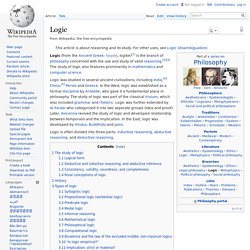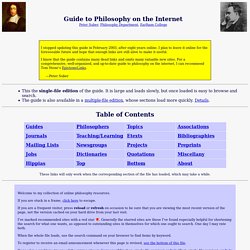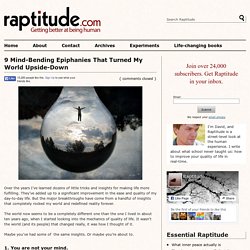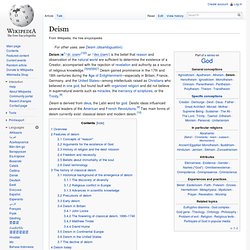

Logic. Logic (from the Ancient Greek: λογική, logike)[1] is the branch of philosophy concerned with the use and study of valid reasoning.[2][3] The study of logic also features prominently in mathematics and computer science.

Logic is often divided into three parts: inductive reasoning, abductive reasoning, and deductive reasoning. The study of logic[edit] EpistemeLinks: Philosophy Resources on the Internet. A List Of Fallacious Arguments. Attacking the person instead of attacking his argument.

For example, "Von Daniken's books about ancient astronauts are worthless because he is a convicted forger and embezzler. " (Which is true, but that's not why they're worthless.) Another example is this syllogism, which alludes to Alan Turing's homosexuality: Turing thinks machines think. Turing lies with men. Learning - Informal Learning Flow. Promoting critical thinking and skepticism about the central beliefs of society. Rationally Speaking. Taxonomy of the Logical Fallacies. 50 Awesome Search Engines Every Librarian Should Know About. By Staff Writers Students, teachers and the public turn to their librarians for help researching everything from technology to genealogy to homework help and lesson plans.

Even if your library is equipped with subscriptions and memberships to top of the line databases and online journals, you’ve probably had to get creative during a patron’s requested search for something unfamiliar. Next time, though, you can turn to one of these 50 search engines, designed to pull from the Web only the information you really need.
Meta Search and Multi Search Engines These meta search and multi search engines can search numerous engines and sites at once, maximizing the number of results you get each time you conduct a search. Ms. Multimedia and Interactive For help finding pictures, podcasts, music and shareware, use these search engines. Google Search Engines A Google search doesn’t just mean typing in a keyword on the homepage and seeing what pops up. Great Niche Sites for Librarians Custom Searches. Philosophy - Education and Science. 100 Incredible Lectures from the World’s Top Scientists. Posted on Thursday June 18, 2009 by Staff Writers.

The Do It Yourself Scholar. 100 Powerful Web Tools to Organize Your Thoughts and Ideas. By Alisa Miller Whether you are a busy executive, a single parent, a freelancer working from home, a student, or a combination of these, you have probably found yourself needing help when it comes to organizing all your thoughts and ideas that occur throughout your busy day.

Now you can turn to these tools found on the Internet that will help you with tasks such as note-taking, bookmarking websites, highlighting important text during online research, creating mind maps, tracking time, keeping up with appointments, collaborating with others, managing projects, and much more. Note-Taking and Documents These tools will help you take notes no matter where you find yourself needing to jot something down. You will also find tools that help you create documents from your notes that you can use or share with others.
Evernote. Bookmarking Del.icio.us. The American Philosophical Association. Portal Libertarianismo. Encyclopedia Britannica. Questia - The Online Library of Books and Journals. PHILWEB HOME. "Great Quotes" The Desire for Learning. I love learning and hope that if you don’t that I can convince you to love it too.

TED: Ideas worth spreading. Guide to Philosophy on the Internet (Suber) Welcome to my collection of online philosophy resources.

If you are stuck in a frame, click here to escape. If you are a frequent visitor, press reload or refresh on occasion to be sure that you are viewing the most recent version of the page, not the version cached on your hard drive from your last visit. I've marked recommended sites with a red star . Generally the starred sites are those I've found especially helpful for shortening the search for what one wants, as opposed to outstanding sites in themselves for which one ought to search. When the whole file loads, use the search command on your browser to find items by keyword. Commons. Philosophy Collection. Philosophical Quotes, Thought-Provoking Sayings.
Related Quotes Hmmm Philosophy Truth Wise Words We are more often treacherous through weakness than through calculation.

~François VI de la Rochefoucault A man with one watch knows what time it is; a man with two watches is never quite sure. ~Lee Segall. Home. 9 Mind-Bending Epiphanies That Turned My World Upside-Down. Over the years I’ve learned dozens of little tricks and insights for making life more fulfilling.

They’ve added up to a significant improvement in the ease and quality of my day-to-day life. But the major breakthroughs have come from a handful of insights that completely rocked my world and redefined reality forever. The world now seems to be a completely different one than the one I lived in about ten years ago, when I started looking into the mechanics of quality of life.
History of Philosophy without any gaps. Philosophy of Religion. Deism. Deism ( i/ˈdiː.ɪzəm/[1][2] or /ˈdeɪ.ɪzəm/) is the belief that reason and observation of the natural world are sufficient to determine the existence of a Creator, accompanied with the rejection of revelation and authority as a source of religious knowledge.[3][4][5][6][7] Deism gained prominence in the 17th and 18th centuries during the Age of Enlightenment—especially in Britain, France, Germany, and the United States—among intellectuals raised as Christians who believed in one god, but found fault with organized religion and did not believe in supernatural events such as miracles, the inerrancy of scriptures, or the Trinity.[8] Deism is derived from deus, the Latin word for god.

Deistic ideas influenced several leaders of the American and French Revolutions.[9] Two main forms of deism currently exist: classical deism and modern deism.[10] Reincarnation. Reincarnation is the religious or philosophical concept that the soul or spirit, after biological death, begins a new life in a new body that may be human, animal or spiritual depending on the moral quality of the previous life's actions. This doctrine is a central tenet of the Indian religions.[1] It is also a common belief of various ancient and modern religions such as Spiritism, Theosophy, and Eckankar and is found in many tribal societies around the world, in places such as Siberia, West Africa, North America, and Australia.[2] In recent decades, many Europeans and North Americans have developed an interest in reincarnation.[6] Contemporary films, books, and popular songs frequently mention reincarnation. In the last decades, academic researchers have begun to explore reincarnation and published reports of children's memories of earlier lives in peer-reviewed journals and books.
Conceptual definitions[edit] Agnosticism. Agnosticism is the view that the truth values of certain claims—especially claims about the existence or non-existence of any deity, as well as other religious and metaphysical claims—are unknown or unknowable.[1][2][3] According to the philosopher William L. Rowe, in the popular sense, an agnostic is someone who neither believes nor disbelieves in the existence of a deity or deities, whereas a theist and an atheist believe and disbelieve, respectively.[2] Thomas Henry Huxley, an English biologist, coined the word agnostic in 1869. However, earlier thinkers have written works that promoted agnostic points of view. These thinkers include Sanjaya Belatthaputta, a 5th-century BCE Indian philosopher who expressed agnosticism about any afterlife,[4][5][6] Protagoras, a 5th-century BCE Greek philosopher was agnostic about the gods.[7] The Nasadiya Sukta in the Rigveda is agnostic about the origin of the universe.[8][9][10] Defining agnosticism[edit] Thomas Henry Huxley said:[11][12] Robert G.